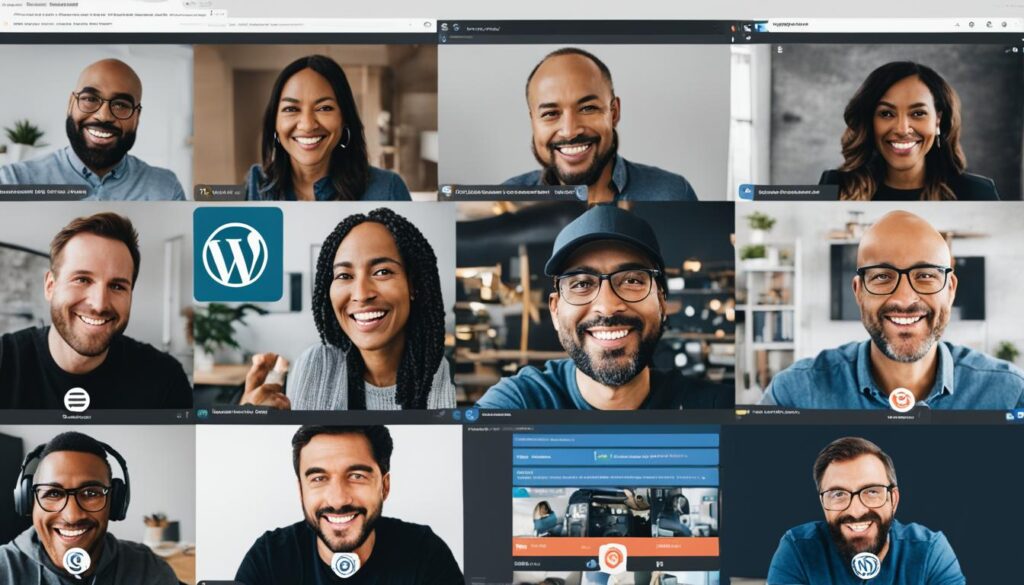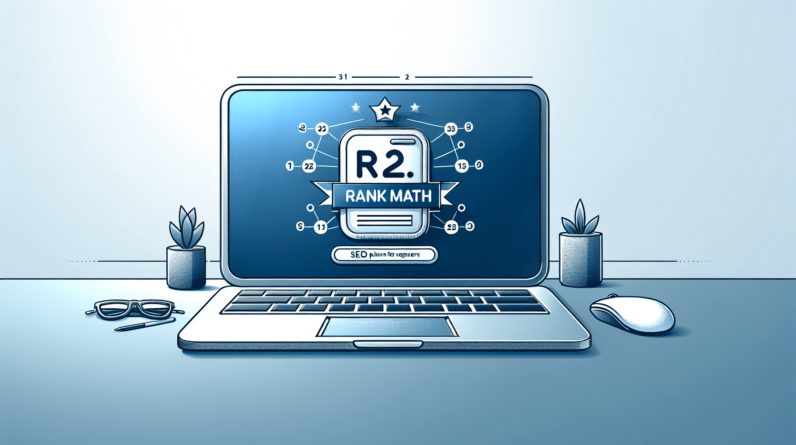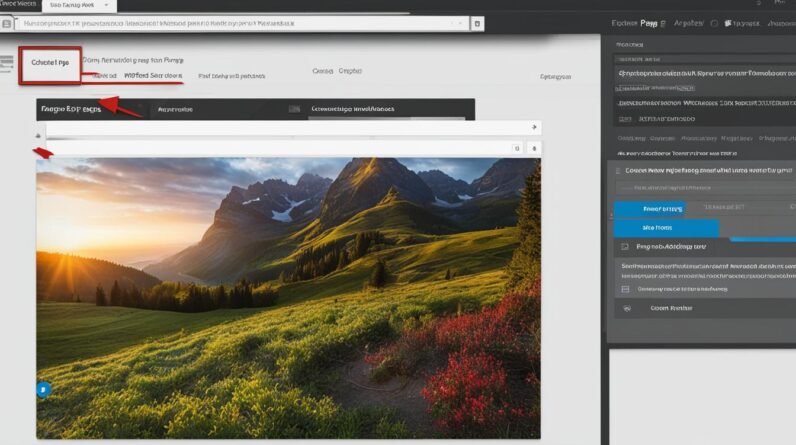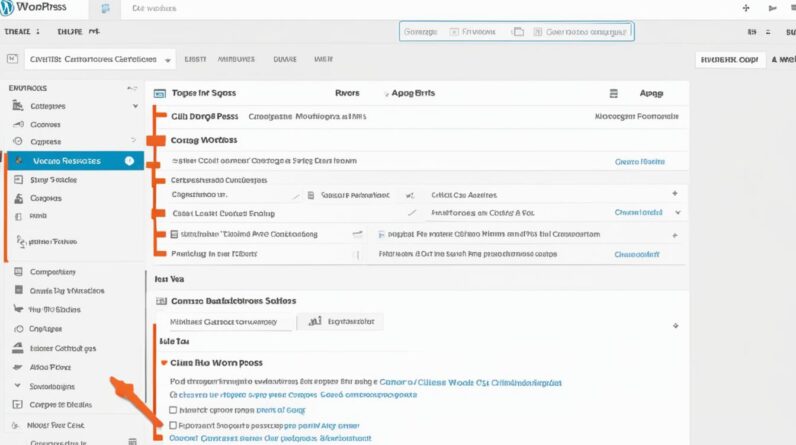Are you considering learning WordPress but wondering how long it will take to master this popular content management system? The answer, as with many skills, is not straightforward and ultimately depends on a variety of factors.
How to Make Money with YouTube
Create an empire of automated video websites for multiple streams of income
Some individuals may be able to grasp the basics of WordPress in just a few weeks, while others may require several months to develop more advanced skills. The duration of your WordPress learning journey will be influenced by factors such as your prior experience, educational background, and learning style.
While it’s important to remember that everyone learns at their own pace, having a general understanding of the expected timelines can help set realistic expectations. In this article, I will guide you through the various stages of mastering WordPress and provide insights into the average time it may take to reach each milestone.
Key Takeaways:
- Learning WordPress can take different durations depending on individual factors.
- Some individuals can master the basics in a few weeks, while others may take several months.
- Factors such as prior experience, educational background, and learning style influence the learning period.
- The journey to WordPress mastery involves understanding fundamentals, exploring themes and design, mastering plugins and functionality, developing advanced skills, staying current with updates, engaging with the community, and gaining practical experience.
- There is no definitive timeline, as learning WordPress is an ongoing process.
Understanding the Fundamentals of WordPress
Before diving into advanced WordPress skills, it is essential to develop a strong foundation in the basics. Whether you’re a beginner or have some experience with WordPress, understanding the fundamental concepts will set you up for success in your learning journey.
First and foremost, familiarize yourself with the WordPress dashboard. This intuitive interface is where you’ll manage and customize your website. Spend some time exploring its various sections and menus to get a feel for its layout and functionality.
Once you feel comfortable navigating the dashboard, you can start creating and managing posts and pages. Posts are typically used for blog entries or time-sensitive content, while pages serve as static, evergreen content such as your homepage, about page, or contact information. Becoming proficient in creating and managing these elements will allow you to effectively showcase your content on your website.
Customizing your WordPress theme is another essential skill. Themes control the design and layout of your website, allowing you to tailor its appearance to suit your brand or personal style. Experiment with different themes and learn how to customize their colors, typography, and overall presentation to create a visually appealing website.
Plugins are a powerful feature of WordPress that extend its functionality. These add-ons can enhance your website with various features such as contact forms, social media integration, SEO optimization, and more. Familiarize yourself with the process of installing and activating plugins to expand your website’s capabilities.
Remember, mastering the basics of WordPress is a crucial stepping stone before delving into more advanced topics. Take your time to understand the fundamentals, practice navigating the dashboard, creating posts and pages, customizing themes, and installing plugins. Building a strong foundation will make your WordPress learning journey smoother and more rewarding.
Key Elements of WordPress Fundamentals
| Element | Description |
|---|---|
| WordPress Dashboard | The control panel where you manage your website’s settings, content, and appearance. |
| Posts | Articles or time-sensitive content displayed on your website in reverse chronological order. |
| Pages | Static content that provides information about your website, such as your homepage, about page, or contact information. |
| Themes | Templates that control the design, layout, and visual appearance of your WordPress website. |
| Plugins | Add-ons that expand the functionality of your website, such as contact forms, social media integration, etc. |
Exploring WordPress Themes and Design
Now that you have a good grasp of the fundamentals, it’s time to dive into the exciting world of WordPress themes and design. This is where you can really let your creativity shine and create visually stunning websites. Whether you’re designing a personal blog or a business website, customizing WordPress themes allows you to create a unique online presence that aligns with your brand and style.
When it comes to WordPress themes, the options are virtually limitless. You can choose from thousands of pre-designed themes available in the WordPress theme directory or explore premium themes from popular providers. These themes come with different layouts, color schemes, and features, allowing you to find the perfect one for your needs.
Once you’ve selected a theme, the real fun begins. Customizing the theme to match your vision is where you can truly make your website stand out. With WordPress’s user-friendly interface, you can easily make changes to the theme’s layout, colors, fonts, and other elements without writing a single line of code.
If you’re feeling more adventurous and want to take your website to the next level, you can explore theme development and create your own custom templates. This requires some knowledge of HTML, CSS, and PHP, but the possibilities are endless. By designing your own themes, you have complete control over the look and functionality of your website.
Customizing WordPress Themes: Tips and Tricks
Here are a few tips and tricks to help you get started with customizing WordPress themes:
- Experiment with different color schemes and fonts to create a cohesive and visually appealing design.
- Utilize plugins to extend the functionality of your theme and add custom features.
- Create a responsive design that looks great on all devices, from desktops to smartphones.
- Optimize your website’s performance by optimizing images, minifying CSS and JavaScript files, and caching.
Remember, the time required for exploring WordPress themes and design largely depends on your creativity, attention to detail, and the complexity of your design aspirations. By immersing yourself in this aspect of WordPress, you’ll be able to create stunning websites that truly reflect your unique style and vision.
Mastering WordPress Plugins and Functionality
WordPress plugins play a vital role in extending the functionality of your website, allowing you to enhance its capabilities and optimize its performance. With a plethora of plugins available, understanding how to leverage their power is essential for mastering WordPress.
Installing and configuring plugins is a straightforward process. From the WordPress dashboard, navigate to the “Plugins” section and click on “Add New.” You can then search for specific plugins or explore featured ones to find the right fit for your needs. Once you’ve found a plugin, simply click on the “Install Now” button to add it to your website.
After installation, activating the plugin is the next step. Upon activation, you may need to configure the settings to customize the functionality based on your requirements. Most plugins provide user-friendly interfaces to simplify the configuration process.
However, it’s important to note that using too many plugins can negatively impact your website’s performance. Carefully consider the plugins you install and deactivate any that are no longer necessary. Regularly evaluating and optimizing your plugin selection will help maintain a high-performance website.
When troubleshooting plugin-related issues, start by deactivating all your plugins and activating them one by one to identify the problematic one. In some cases, conflicts may arise between different plugins or between a plugin and your theme. Understanding how to diagnose and resolve these conflicts is crucial for ensuring a smooth functioning website.
Optimizing WordPress Performance with Plugins
Optimizing your WordPress performance is another crucial aspect of mastering the platform. Plugins can significantly contribute to improving your website’s speed and efficiency.
Some popular performance optimization plugins include:
- WP Rocket: This caching plugin helps reduce load times and improve overall performance.
- Smush: By optimizing and compressing images, this plugin enhances your site’s loading speed.
- W3 Total Cache: This plugin provides page caching, browser caching, and database caching, among other performance-enhancing features.
Integrating these plugins and configuring them according to your website’s requirements can have a significant impact on its performance, ensuring a seamless user experience.
As you delve into the world of plugins and explore their functionalities, keep in mind that not all plugins are created equal. Prioritize quality, reliability, and compatibility when selecting plugins for your website. Regularly update them to take advantage of new features and security patches, ensuring your site remains secure and up to date.
Mastering WordPress plugins and their functionality is a key step toward unleashing the full potential of your website. By carefully selecting and optimizing plugins, you can take your website to new heights while providing an exceptional user experience.
Advanced WordPress Development and Customization
As you progress in your WordPress learning journey, you may find yourself yearning for more advanced skills and knowledge. This is where advanced WordPress development and customization comes into play.
When you delve into the realm of advanced WordPress development, you open up a world of possibilities. This includes mastering PHP coding to create custom functionalities, building WordPress themes from scratch, and optimizing website performance to ensure a seamless user experience.
Customizing WordPress Websites
One aspect of advanced WordPress development is the ability to customize websites to fit your unique vision and requirements. You can go beyond simply selecting and modifying pre-designed themes. With the skills gained through advanced learning, you’ll have the confidence to create tailor-made websites, perfectly tailored to your clients’ or personal needs.
Customizing WordPress websites involves understanding the intricacies of CSS and HTML, effectively using child themes, and implementing custom functions and hooks. By taking customization to the next level, you have the power to create stunning and distinctive websites that truly stand out.
Building WordPress Themes
If you have a penchant for design and creativity, building WordPress themes from scratch can be a rewarding pursuit. This advanced skill requires a deep understanding of PHP, HTML, and CSS. By mastering these languages, you’ll be able to craft unique themes that align perfectly with your clients’ or project’s aesthetic and functional requirements.
Building WordPress themes also allows you to showcase your creativity and push the boundaries of design. From typography and color schemes to layout and responsiveness, you have complete control over every aspect of your theme.
WordPress Coding and Optimization
As an advanced WordPress developer, honing your coding skills is paramount. This involves not only being proficient in PHP but also understanding WordPress-specific coding practices and optimization techniques. Optimizing your website’s performance ensures fast loading times, efficient resource usage, and a seamless user experience.
By diving into the world of WordPress coding, you can create advanced functionalities, integrate third-party APIs, and optimize your website for search engines. This level of expertise sets you apart and paves the way for developing complex and innovative web applications.
To showcase the value of advanced WordPress development and customization, I’ve compiled a table summarizing the key skills and concepts you can expect to learn in this stage of your journey.
| Skills and Concepts | Description |
|---|---|
| Advanced PHP Coding | Mastering PHP to create custom functionalities and implement advanced WordPress features. |
| Custom Theme Development | Building WordPress themes from scratch to achieve complete design control and meet specific project requirements. |
| Website Optimization | Applying optimization techniques to improve website performance, speed, and user experience. |
As you can see, advanced WordPress development and customization expand your capabilities and empower you to create truly remarkable websites. However, it’s worth noting that the time required to master these advanced skills depends on your programming abilities and dedication to continuous learning.
Keeping Up with WordPress Updates and Best Practices
In the dynamic world of WordPress, staying current with the latest updates and best practices is crucial to ensuring the optimal performance and security of your website. As new features are introduced and industry standards evolve, keeping up with these changes will help you maintain a competitive edge and deliver the best user experience.
To stay current with WordPress updates, it’s important to regularly check for new versions of WordPress and promptly install them. These updates often include security patches, bug fixes, and performance enhancements that address vulnerabilities and improve the overall functionality of your website.
Staying current with WordPress also involves following best practices and adhering to WordPress standards. By implementing best practices, you can optimize your website for search engines, improve its loading speed, and enhance the overall user experience. This includes utilizing responsive design, properly structuring your content, optimizing images, and implementing clean code.
To ensure your WordPress website remains secure and performs optimally, regular maintenance is essential. This involves backing up your website regularly, monitoring for any security breaches or malware, optimizing your database, and removing unnecessary plugins or themes. By proactively maintaining your website, you can prevent potential issues and ensure its long-term success.
Keeping up with WordPress updates and best practices requires ongoing learning and staying informed about the latest trends in the WordPress community. There are various resources available, such as webinars, workshops, forums, and blogs, that can help you stay up to date. Engaging with the WordPress community and seeking out reputable sources of information will help you stay ahead of the curve and make informed decisions regarding your website.
Benefits of Keeping Up with WordPress Updates and Best Practices
- Enhanced Security: Regularly updating WordPress and following best practices minimizes the risk of security breaches and keeps your website secure.
- Improved Performance: By adhering to best practices, you can optimize your website’s speed, resulting in a better user experience and higher search engine rankings.
- Compatibility: Staying current with updates ensures that your website remains compatible with the latest versions of WordPress and third-party plugins.
- Access to New Features: Updating WordPress allows you to leverage the latest features and functionalities introduced by the WordPress community.
- Stay Ahead of Competitors: By staying up to date with updates and best practices, you can differentiate yourself from competitors who may not be as proactive in maintaining their WordPress websites.
| Benefits of Keeping Up with WordPress Updates and Best Practices | Good Practices | Outdated Practices |
|---|---|---|
| Enhanced Security | Regularly updating WordPress | Ignoring updates and patches |
| Improved Performance | Following best practices for speed optimization | Using outdated themes and plugins |
| Compatibility | Ensuring compatibility with the latest versions of WordPress and plugins | Using outdated or unsupported plugins |
| Access to New Features | Updating WordPress to leverage new features | Missing out on new functionalities |
| Stay Ahead of Competitors | Staying proactive in maintaining your WordPress website | Neglecting website updates |
Exploring WordPress Resources and Community Support
When learning WordPress, it’s essential to have access to reliable resources and a supportive community. Fortunately, the WordPress ecosystem offers a wealth of valuable tools, forums, and communities to help you on your journey.
One of the best ways to expand your knowledge is by tapping into the expertise of WordPress experts. Many experienced developers and industry leaders share their insights through blogs, websites, and podcasts. Taking advantage of these resources allows you to learn from the best and stay up to date with the latest trends and techniques.
In addition to learning from experts, engaging with the WordPress community can provide tremendous support and inspiration. Participating in online forums and communities allows you to connect with other WordPress enthusiasts, ask questions, and share experiences. The collective wisdom of the community can help you overcome challenges, find innovative solutions, and build lasting connections.
Whether you’re a beginner or an advanced developer, there are numerous WordPress forums and communities where you can seek assistance or offer your expertise. These platforms allow you to interact with like-minded individuals, exchange ideas, troubleshoot issues, and gain valuable insights into WordPress development and best practices.
Some popular WordPress forums and communities include:
- WordPress.org Support Forums: The official support forums provided by WordPress.org are a great place to seek help and advice. The community is active and responsive, with experienced members ready to assist you.
- Stack Exchange WordPress Development: This Q&A platform allows you to ask specific WordPress development-related questions and receive answers from the community. It is a valuable resource for troubleshooting and learning from experts.
- WordPress Subreddit: The WordPress subreddit is a vibrant community where you can engage in discussions, share your work, and learn from fellow WordPress enthusiasts.
- Facebook Groups: There are numerous WordPress-focused Facebook groups where you can connect with developers from all over the world. These groups often host discussions, share resources, and provide support.
By actively exploring WordPress resources and engaging with the community, you can enhance your learning journey and become part of a supportive network of developers. Take advantage of the knowledge and experiences of others to accelerate your growth and become a proficient WordPress developer.
| WordPress Resources and Community Support | Description |
|---|---|
| WordPress.org Support Forums | Official forums for seeking help and advice from the WordPress community. |
| Stack Exchange WordPress Development | A Q&A platform to ask specific WordPress development-related questions and learn from experts. |
| WordPress Subreddit | A vibrant Reddit community for discussions, sharing work, and learning from fellow WordPress enthusiasts. |
| Facebook Groups | Various Facebook groups dedicated to WordPress where you can connect, discuss, and seek support. |

Building Your WordPress Portfolio and Practical Experience
As I mentioned earlier, gaining practical experience is a crucial step in mastering WordPress. One effective way to do this is by building your WordPress portfolio through real-world projects.
Working on real projects, whether they are for clients or personal ventures, allows you to apply your knowledge and showcase your abilities. It gives you the opportunity to face challenges and learn how to solve them in a real-world context. This hands-on experience is invaluable in developing and refining your WordPress skills.
The more projects you take on, the more practical experience you gain. Each project presents unique situations and problems to solve, helping you broaden your understanding of WordPress and become more proficient in its application. Remember, practice makes perfect!
The time required for this stage of learning will depend on the number and complexity of the projects you undertake. The more time and effort you invest in building your WordPress portfolio, the more well-rounded your experience will be — and the stronger your skills will become.
To give you an idea of the various types of projects you could work on, here is a table highlighting a few examples:
| Project Type | Description |
|---|---|
| Client Website | Designing and developing a website for a real client, showcasing your ability to meet their specific needs and requirements. |
| Personal Blog | Creating your own blog to share your thoughts, knowledge, and interests with the world, demonstrating your ability to customize and optimize your own WordPress website. |
| E-commerce Store | Building an online store where users can browse and purchase products, showcasing your skills in integrating and managing e-commerce functionality. |
| Community Website | Creating a platform for a specific community or organization, allowing members to interact, share information, and collaborate. |
Remember, these are just a few examples. The possibilities are endless! The key is to choose projects that align with your interests and goals, allowing you to continuously challenge yourself and expand your WordPress knowledge.
By building your WordPress portfolio and gaining practical experience through real-world projects, you not only solidify your skills but also establish a tangible representation of your abilities for potential clients or employers. It’s a win-win situation!
Now, let’s move on to the next section, where we’ll discuss staying up to date with WordPress updates and best practices. This is another crucial aspect of your WordPress journey, so stay tuned!
Conclusion
Learning WordPress is a dynamic and rewarding journey that can vary in duration for each individual. Whether it takes weeks or months, the key to reaching WordPress mastery lies in a step-by-step approach. Starting with the fundamentals, familiarizing yourself with the WordPress dashboard, creating and managing posts and pages, and customizing themes lay a strong foundation.
Exploring themes and design allows you to unleash your creativity and create visually appealing websites. Mastering plugins and functionality enhances the overall user experience by adding specific features and optimizations to your site. Delving into advanced development and customization, such as PHP coding and creating custom themes, takes your skills to the next level.
Keeping up with WordPress updates and best practices ensures your knowledge stays current and aligns with industry standards. Engaging with the WordPress community and utilizing available resources, such as online forums and communities, provides invaluable support and knowledge sharing. Building your WordPress portfolio and gaining practical experience through real-world projects further solidifies your expertise.
In conclusion, with dedication and persistence, you can navigate the learning curve and unlock the full potential of WordPress. Remember that learning WordPress is not a destination but rather an ongoing journey of growth and discovery. Embrace each stage, stay curious, and continue enhancing your WordPress proficiency. Congratulations on your progress thus far, and may your future endeavors in WordPress be filled with success!
FAQ
How long does it take to learn WordPress?
The time it takes to learn WordPress can vary depending on factors such as prior experience, educational background, and learning style. Some individuals may be able to grasp the basics in a few weeks, while others may take several months to develop advanced skills.
What are the fundamentals of WordPress?
The fundamentals of WordPress include learning how to navigate the WordPress dashboard, creating and managing posts and pages, customizing themes, and installing plugins. Mastering these basics is essential for further WordPress learning.
How do I explore WordPress themes and design?
To explore WordPress themes and design, you can select and customize themes to create visually appealing websites. You can also delve into more advanced topics such as theme development and creating custom templates.
How do I master WordPress plugins and functionality?
Mastering WordPress plugins involves learning how to install and configure plugins, as well as troubleshooting any issues that may arise. This knowledge is crucial for expanding the capabilities of your website and adding specific features or optimizations.
How can I advance my WordPress development and customization skills?
To advance your WordPress development and customization skills, you can explore more complex concepts such as PHP coding, creating custom themes and templates, implementing advanced functionalities, and optimizing website performance.
How do I stay up to date with WordPress updates and best practices?
Staying current with WordPress involves keeping up with regular updates and new best practices introduced by the platform. This may require ongoing learning, attending webinars or workshops, and actively seeking out resources to stay informed about the latest standards.
What resources and support are available for learning WordPress?
The WordPress community offers numerous online forums, communities, and resources where you can connect with other WordPress enthusiasts, ask questions, and learn from experienced developers. Engaging with the WordPress community can enhance your learning journey and provide additional insights and perspectives.
How can I gain practical experience with WordPress?
Building your portfolio by working on real-world projects, whether for clients or personal ventures, allows you to apply your knowledge and showcase your abilities. The more hands-on experience you gain, the more proficient you will become in mastering WordPress.
What is the timeline to reach WordPress mastery?
The timeline to reach WordPress mastery can range from weeks to months, depending on individual factors and the depth of knowledge and skills you aim to acquire. It is important to start with the fundamentals, explore themes and design, master plugins and functionality, delve into advanced development and customization, stay current with updates and best practices, engage with the WordPress community, and gain practical experience through real-world projects.






